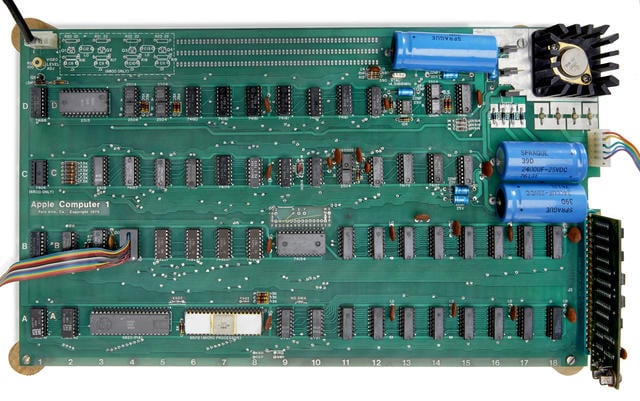
What is the world’s most expensive personal computer? The groundbreaking Apple-1, which fetched nearly a million dollars at the first History of Science auction at Bonhams New York this week. (In the interest of completeness, Cray XC-300 supercomputer goes for an even more astronomical $3 million.) It seems like it may be time to start keeping an eye on the vintage computer market.
The first pre-assembled personal computer ever-sold, the Apple-1 launched the personal computer revolution. Before Apple, few could imagine wanting or needing the now-indispensable personal computer.
The record-breaking model sold at Bonhams was one of 50 Apple-1s Steve Wozniak built by hand in Steve Job’s garage, or arguably in his sister’s bedroom, way back in 1976. It includes a working motherboard, Sanyo monitor, power supply, two tape decks, and a pre-7400 series military spec chip keyboard, all vintage. The lot also came with Apple ephemera from the era, including a 1979 Cincinnati AppleSiders “Poke-Apple” newsletter, and a video featuring a speech given by Wozniak at the 1980 “Applevention.”
After a heated battle with a bidder participating over the phone, the Henry Ford Museum of Dearborn, Michigan, successfully secured the coveted granddaddy of the personal computer with a winning bid of $905,000. This nearly doubled the pre-sale estimate of $300,000–500,000.
“The provenance on the Apple-1 is excellent and the condition is outstanding, so it was not surprising that it did so well,” said Cassandra Hatton, the science sale’s senior specialist in a statement.
A video on the Bonhams website shows the Apple-1 in action. Much like the Andy Warhol computer art that was rediscovered earlier this year (see “Cory Arcangel Excavates Andy Warhol’s Digital Art from Ancient Floppy Disks“), it serves as a real reminder of how far computer technology has come in such a comparatively short period of time—although watching the computer generate ASCII art is still kind of impressive.